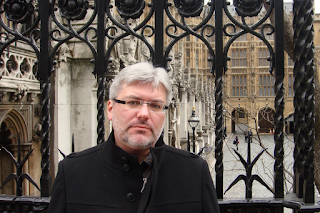It begins with a chance meeting on an airplane, traveling from Paris to St. Petersburg. Gleb Yanovsky, a world-famous guitarist, is seated next to a writer, Sergei Nesterov. They eventually agree to write a book about Yanovksy’s life. And this begins years of a collaboration that takes Yanovsky back to his childhood, his youth, and his adulthood, a story that coincides with the decline and fall of the Soviet Union, the creation of Ukraine as an independent state, and the unsettled years that follow.
Several books have been written about him, Gleb says, but none has told the story of his life. What plays a role in Gleb’s decision to allow Nesterov access for writing a book is that Gleb has been diagnosed with Parkinson’s disease. He’s facing the end of his career.
Yanovsky is Ukrainian, born in Kyiv. His father is an ardent Ukrainian nationalist. Early on, his mother separates and divorces his father. Gleb is essentially reared by his maternal grandmother. His mother’s dream is to live in Australia, and she will eventually correspond with a man in Brisbane and agree to marry him. Gleb remains home. He attends music school, but his father doubts whether the son has a gift for music. But the sound eventually proves the father wrong, although it will be many years in the future.
Brisbane by Eugene Vodolazkin tells the story of Gleb Yanovsky. First published in Russian in 2018 and now translated by Marian Schwartz, it is a story of music, politics, love, and family. Given the current invasion of Ukraine by Russia, it is also an unsettling book to read.
 |
| Eugene Vodolaazkin |
The underlying animosity between Russia and Ukraine is ever-present. Gleb’s father is a Ukrainian; Gleb, educated in both Kyiv and St. Petersburg, feels part of both countries. After the collapse of the Soviet Union and the emergence of an independent Ukraine, Gleb experiences the animosity more directly.
But the novel is more about music and how music comes to structure a man’s life. It is only by chance that a producer, attending an art gallery show in Munich, happens to hear Gleb play the guitar and hum while he pays (which becomes his artistic trademark). His career doesn’t so much take flight as rockets upward, until decades later when Gleb must confront Parkinson’s disease.
One suspects that Brisbane contains a not inconsiderable number of autobiographic elements. Like his protagonist, Vodolazkin was born in Kyiv and educated in St. Petersburg. Both initially become teachers (Volodolazkin remains one). Both are involved in philology and literature. Voloalazkin works in the department of Old Russian Literature at the Pushkin House in St. Petersburg, where he is an expert in medieval Russian history and folklore. The author of several novels, he was awarded the Aleksandr Solzhenitsyn Literature Prize in 2019. His novel Laurus won the Russian Big Book Award and the Yasnaya Polyana Literary Award.
A word about the translation. I don’t speak or read Russian, so I can’t speak to the quality of the translation. But I can say that the novel doesn’t have any of the linguistic awkwardness one can often find in translations. Swartz also has extensive experience in translation works of Russian literature, including Aleksandr Solzhenitsyn’s multi-volume The Red Wheel, his story of the Russian Revolution.
To read Brisbane is to discover conflict, language, music, and life. It’s a wonderful novel.
Related:
The Aviator by Eugene Vodolazkin.
How the Russian and Ukrainian Languages Intersect in Eugene Volodolazkin’s Brisbane (by Marian Schwartz, the translator).

No comments:
Post a Comment